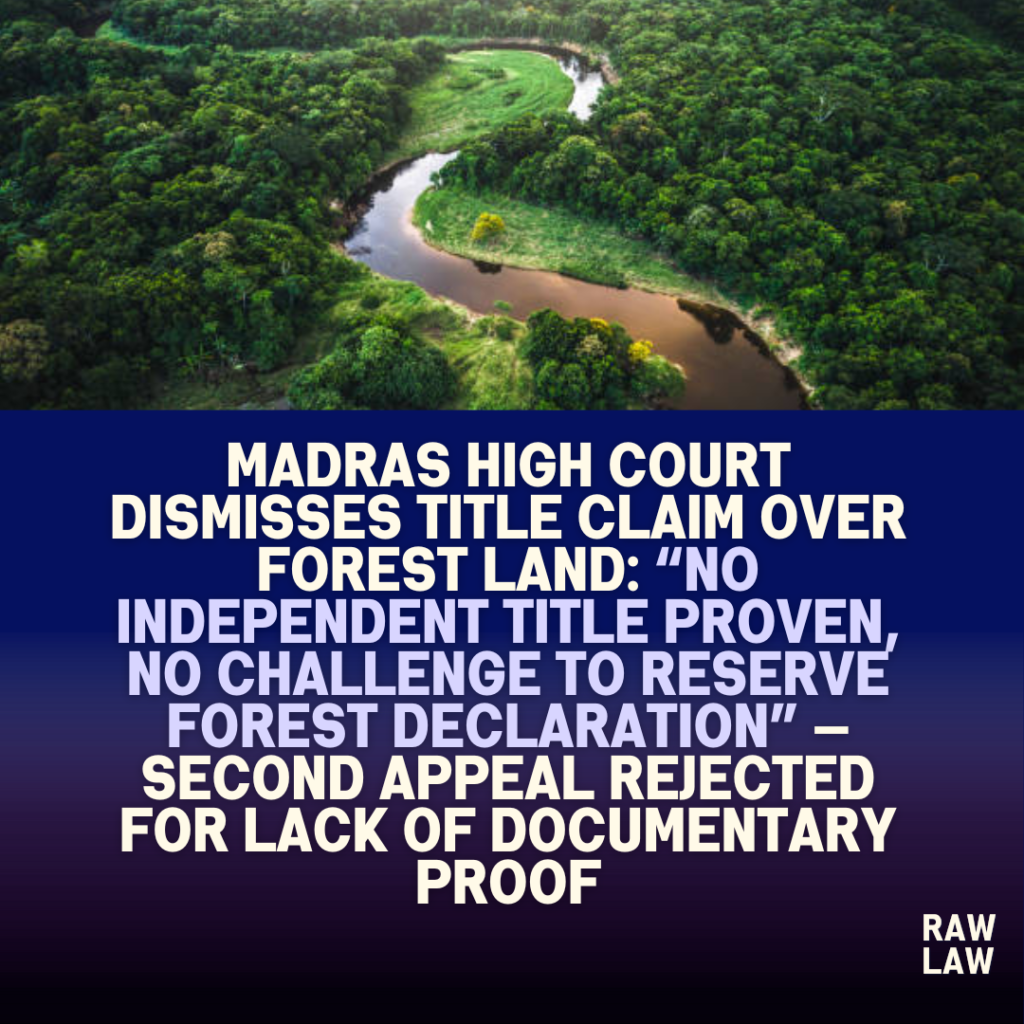Court’s Decision
The Madurai Bench of the Madras High Court dismissed a second appeal filed by the plaintiffs challenging concurrent findings of the lower courts that had rejected their suit for declaration and injunction over 16.49 acres of Reserve Forest land. The Court held that:
“The plaintiffs have not independently established their title to the Reserve Forest land through legal documents and oral evidence as held by both the Courts below.”
Reaffirming that the land was rightly classified and maintained as a Reserve Forest, the Court upheld the judgments of the Trial Court and the First Appellate Court and dismissed the Second Appeal.
Facts
The plaintiffs claimed title to 16.49 acres of land, originally belonging to the Bodinayakanur Zamin, alleging that it was assigned to one Perumal Naickar during the Zamin period. They contended that Naickar developed the land by planting Silk Cotton, Coffee, and Citron plants, and later partitioned the property within his family. Following this, plaintiffs 2 to 5 purchased the land from Naickar’s sons in 1969. They sought a declaration of absolute title and permanent injunction against the Government’s interference.
The Government, however, asserted that the land was taken over under the Tamil Nadu Estates (Abolition and Conversion into Ryotwari) Act, 1948, and declared as Reserve Forest on 02.06.1954 through appropriate notifications. The plaintiffs’ request for a Ryotwari Patta was rejected, and the suit was filed decades after the land was classified as forest land.
Issues
- Whether the plaintiffs were entitled to a declaration of title and consequential permanent injunction over the suit property?
- Whether the plaintiffs had encroached on Reserve Forest land?
- Whether the suit was barred by limitation?
- Whether the lower courts erred in rejecting the plaintiffs’ claim?
Petitioners’ Arguments
The plaintiffs argued that Exs. A1 to A8 established their title and possession. They maintained that their vendor had applied for reclassification and Ryotwari Patta, which was remitted by the High Court to the Government for reconsideration. They contended that the civil court retained jurisdiction to decide title independently, relying on the Supreme Court decision in State of Tamil Nadu v. Ramalinga Samigal Madam (AIR 1976 SC 794).
Respondents’ Arguments
The Government countered that the suit land was declared Reserve Forest long ago through due legal process under the Estate Abolition Act and the Tamil Nadu Forest Act. They emphasized that the plaintiffs had not produced any document to prove title or show that their vendor had legal possession prior to 1954. It was also pointed out that the plaintiffs did not challenge the government notifications declaring the area as Reserve Forest.
Analysis of the Law
The Court noted that the Estate Abolition Act enabled the Government to take over Zamin lands, and a Reserve Forest declaration had been issued as early as 1954, followed by Gazette notifications in 1977. It was undisputed that no Ryotwari Patta was granted, and there was no title deed or proof of assignment from the Zamin to the plaintiffs’ vendor. Moreover, as per the Tamil Nadu Forest Act, once an area is declared as Reserve Forest, no private title can be claimed without challenging such declaration — which was not done in this case.
Precedent Analysis
- State of Tamil Nadu v. Ramalinga Samigal Madam (AIR 1976 SC 794): Cited by the appellants to argue that civil courts retain jurisdiction to decide title even after forest or land acquisition proceedings. However, the Court clarified that the plaintiffs had not demonstrated independent title to invoke such jurisdiction.
- T.N. Godavarman Thirumulpad v. Union of India (2006) 5 SCC 28: Relied on by the Court to reaffirm the importance of protecting forest lands and to highlight that once declared, the burden lies on the claimant to establish superior title.
- 2025 INSC 701: Cited by the Court to underscore the Supreme Court’s recent reiteration on the need to preserve and protect Reserve Forests.
Court’s Reasoning
The Court emphasized that:
“There was no document produced to prove the vendor’s assignment or possession before the Estate Abolition Act came into force. Even the plaintiffs admitted the Government’s takeover in 1954.”
Further, the plaintiffs’ claim was based solely on a sale deed dated 26.07.1969, executed at a time when the seller’s application for Ryotwari Patta had not even been decided. The plaintiffs also did not challenge the 1954 and 1977 notifications declaring the land as Reserve Forest.
The Court called for the original forest records, which confirmed the land’s classification as Reserve Forest, with no current encroachments.
Conclusion
The Second Appeal was dismissed, with the Court confirming that both lower courts rightly held that the plaintiffs failed to establish independent title to the land. The reliefs sought were thus denied, and the concurrent findings were upheld.
Implications
- The judgment affirms that forest land cannot be claimed through unverified historical possession or sale deeds that lack legal foundation.
- Civil courts may assess title claims, but only where prima facie title is proven with documents predating government acquisition.
- The ruling strengthens the legal sanctity of Reserve Forest declarations under the Forest Act and Estate Abolition Act, discouraging belated and unsupported claims over forest areas.
FAQs
Q1. Can civil courts decide title disputes over Reserve Forest lands?
Yes, civil courts can decide such disputes. However, the claimant must first establish a valid title through evidence predating the Reserve Forest declaration.
Q2. What happens if the land was declared Reserve Forest and the claimant never challenged it?
The declaration stands unchallenged in law. A claim of title without disputing the forest notification has no legal basis.
Q3. Does long-standing possession establish title in forest land disputes?
No. Mere possession without proof of legal assignment or ownership is insufficient, especially in cases involving government-declared forest lands.
